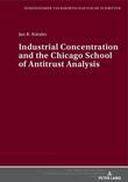Explore

Industrial Concentration and the Chicago School of Antitrust Analysis
Jan B. Rittaler
2018
0 Ungluers have
Faved this Work
Login to Fave
After roughly 15 years of merger control application in the Federal Republic of Germany a <I>reassessment of the significance</I> of this instrument of antitrust policy seems necessary. This is particularly so in view of the <I>reorientation of merger</I> <I>control policy in the United States</I> which has been - in its original version - the model for the German merger control system.<BR> Concerning merger control, the reorientation is characterized by the notion that the <I>structure-conduct-performance paradigm</I> which has dominated U.S. antitrust for a quarter of a century is imprecise or even incorrect and «that bigness in business does not necessarily mean badness.»<BR> This makes the fundamental question arise of whether the German merger control system is still up to date in terms of the underlying market theory and of whether the <I>German Act Against</I> <I>Restraints of Competition</I> needs a reorientation towards aspects of market conduct and performance instead of market structure by means of a Fifth Amendment.
This book is included in DOAB.
Why read this book? Have your say.
You must be logged in to comment.
Rights Information
Are you the author or publisher of this work? If so, you can claim it as yours by registering as an Unglue.it rights holder.Downloads
This work has been downloaded 296 times via unglue.it ebook links.
- 166 - pdf (CC BY) at OAPEN Library.
Keywords
- Analysis
- Antitrust
- Antitrust law
- Basis
- Chicago
- Chicago school of economics
- Competition
- Concentration
- Critical
- Economics
- Economics, finance, business & management
- Effective
- Evaluation
- Industrial
- Industrial concentration
- Jurisprudence & general issues
- Law
- Rittaler
- School
- thema EDItEUR::K Economics, Finance, Business and Management::KC Economics
- thema EDItEUR::L Law::LA Jurisprudence and general issues
Links
DOI: 10.3726/b13907Editions

